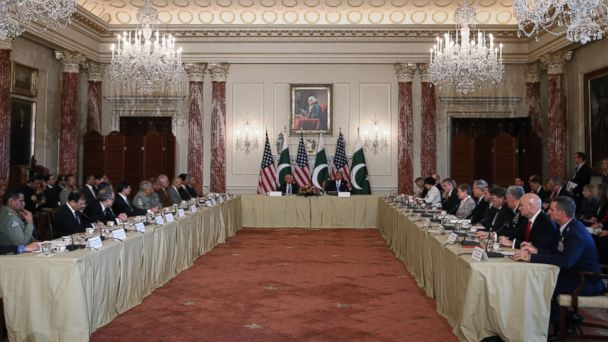Pakistan and US Back at the Table: Why It Matters

(Mark Wilson/Getty Images)
The meeting between large U.S. and Pakistani delegations at the State Department on Monday looked on the surface like any other grip-and-grin style powwows that are part of daily life at the agency, where ministers restate their commitment to x and express their mutual agreement of y.
But this round of talks, headed by Secretary of State John Kerry and Pakistani foreign affairs adviser Sartaj Aziz, was notable simply because the two sides were sitting at a table breaking Danish together.
Talks with the Pakistanis at this high a level (the countries' two top foreign ministers) haven't happened since 2011, when the United States' secret raid in Pakistan on Osama bin Laden led to a Pakistani backlash that chilled relations between the two countries.
And while it may not be a return to perfect harmony, experts on the region say it's at least a good sign.
"It's a tentative effort to return to normal business after a pretty jarring near-rupture," said Daniel Markey, a former State Department official who worked extensively on South Asian issues. "There's still a great deal of skepticism on both sides."
Both countries have an interest in keeping relations above-freezing. The United States has launched, and wants to continue conducting, drone strikes into Pakistan's tribal areas to go after al-Qaeda operatives and other militants there, despite the Pakistan government's outcry against such attacks, at least to domestic audiences.
And Pakistan knows it needs the support of the United States when it withdraws American troops from Afghanistan - something Aziz, the foreign adviser, acknowledged Monday.
"Pakistan's security concerns were not taken into account when the U.S. decided to withdraw from Afghanistan in the early '90s after the defeat of the Soviet forces," Aziz said, seeming to fear past as precedent. "Pakistan will have to face the brunt of any instability that may engulf Afghanistan after 2014."
While security and counterterrorism was part of Monday's talks, the work will continue at several other summits in the coming months, State Department officials said, where the U.S. and Pakistan will have the chance to face each other at long diplomatic tables once again.